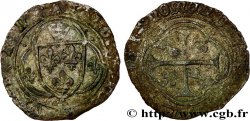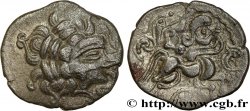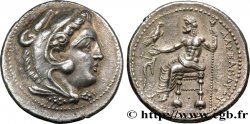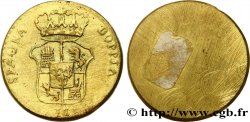Live auction - bry_707090 - CHARLES VIII Écu d'or au soleil, type spécial à la croix cantonnée de lettres n.d. Poitiers
You must signin and be an approved bidder to bid, LOGIN TO BID. Accounts are subject to approval and the approval process takes place within 48 hours. Do not wait until the day a sale closes to register. Clicking on "BID" constitutes acceptance of the terms of use of cgb.fr private live auctions.
Bids must be placed in whole Euro amounts only. The sale will start closing at the time stated on the item description; any bids received at the site after the closing time will not be executed. Transmission times may vary and bids could be rejected if you wait until the last second. For further information check the Live auction FAQ
All winning bids are subject to a 18% buyer’s fee.
All winning bids are subject to a 18% buyer’s fee.
| Estimate : | 2 800 € |
| Price : | no bid |
| Maximum bid : | no bid |
| End of the sale : | 08 March 2022 16:33:02 |
Type : Écu d'or au soleil, type spécial à la croix cantonnée de lettres
Date: 1494
Date: n.d.
Mint name / Town : Poitiers
Metal : gold
Millesimal fineness : 963 ‰
Diameter : 27 mm
Orientation dies : 7 h.
Weight : 3,41 g.
Rarity : R3
Coments on the condition:
Cet écu d’or est frappé sur un flan un peu court et irrégulier. De petites rayures dans les champs. Des éléments du revers apparaissent en négatif au droit
Catalogue references :
Obverse
Obverse legend : (COURONNE) KAROLVS° DEI° GRA° FRANCORVM° REX, (PONCTUATION PAR DEUX ANNELETS SUPERPOSÉS).
Obverse description : Écu de France couronné sous un soleil.
Obverse translation : (Charles, par la grâce de Dieu, roi des Francs).
Reverse
Reverse legend : (COURONNE) XPS° VINCIT° XPS° REGNAT° XPS° IPERAT, (PONCTUATION PAR DEUX ANNELETS SUPERPOSÉS).
Reverse description : Croix fleurdelisée avec quadrilobe en cœur cantonnée au 1 d’un P, au 4 d’un T.
Reverse translation : (Le Christ règne, le Christ vainc et commande).
Commentary
Écu d’or particulièrement rare avec les lettres P et T en cantonnement de la croix du revers. Ces lettres ont été placées durant le premier semestre 1494 suite à une chevauchée d’un général maître des monnaies qui passa également à Limoges, Bordeaux et Bayonne. La Chambre des monnaies fit rapidement enlever ces lettres.







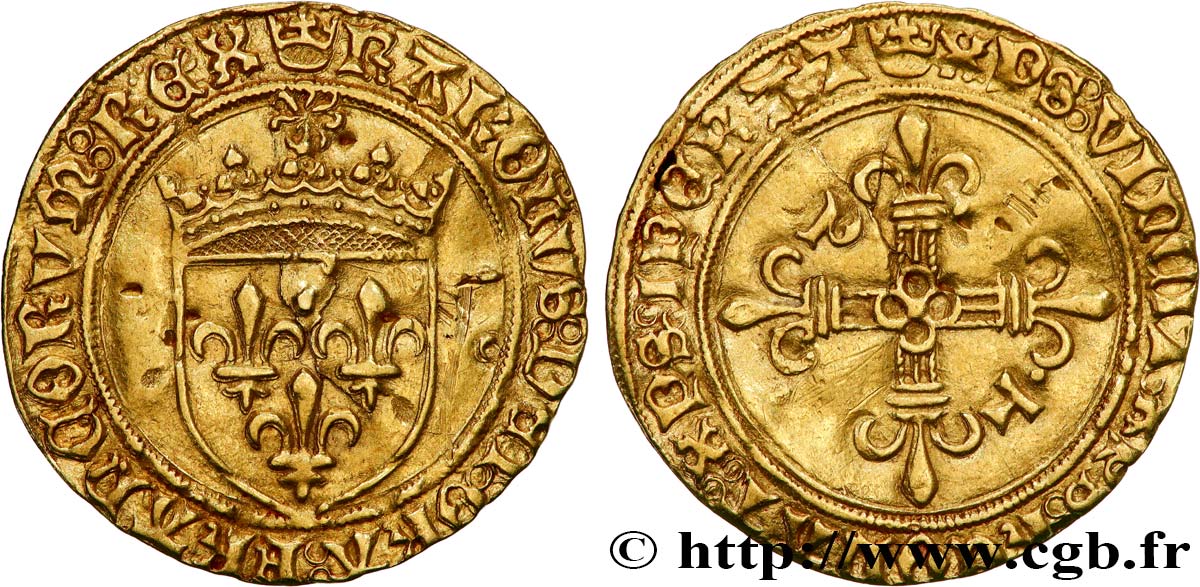
 Report a mistake
Report a mistake Print the page
Print the page Share my selection
Share my selection Ask a question
Ask a question Consign / sell
Consign / sell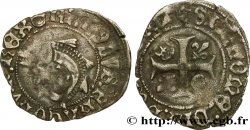
 Full data
Full data